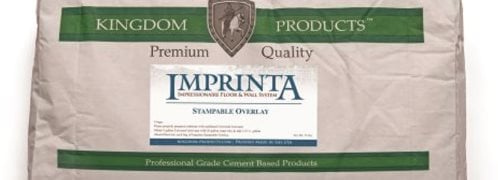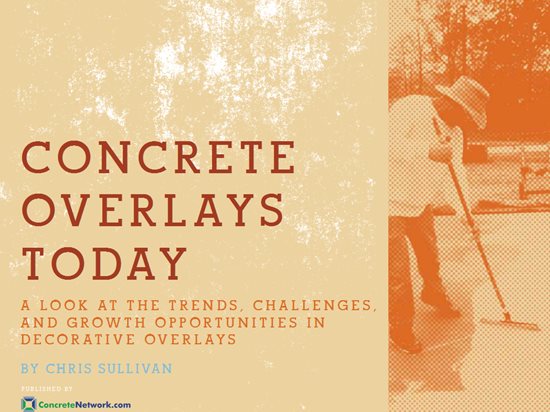- Concrete Overlays Home
- Get the Look - Interior Overlay Pictures
- When to Use a Polymer Overlay
- Comparison Chart of Overlay Systems: Which is best for your project?
- Five Factors to Consider when Choosing a Resurfacing System
- Concrete Overlay Reviews
- Types of Overlays
- Epoxy Coatings
- Microtoppings & Skim Coats
- Self-Leveling Overlays
- Spray-Down Toppings
- Polishable Overlays
- Stamped Concrete Overlays
- Preparing Concrete for Resurfacing
- Concrete Resurfacing
- Reducing Bond Failures Caused by Moisture-Vapor Transmission
- Don't Let Water Vapor Delaminate Your Overlay: How to seal concrete before an overlay
- How-To Tips for Installing Concrete Overlays
- Answers to Common Questions About Concrete Overlays: Advice from expert Chris Sullivan
- How to Add Color to Concrete Overlays
- How to Protect and Maintain Resurfaced Concrete
- Overlay Tools: Seven essential tools for concrete resurfacing
- Related Information
- Concrete Overlay Videos, with Bob Harris
- Decorative Concrete Overlays: A primer of the various overlay types and the decorative possibilities with each
- Vertical Concrete Overlays: Lightweight cement-based overlays mimic stone, brick, and other wall textures
Trends in Tools for Installing Decorative Overlays
While handcrafted finishes are still the gold standard, new equipment and tools are available to speed the application processThis is an excerpt from the new e-book “Concrete Overlays Today,” part of a series of reports from ConcreteNetwork.com on trends and insights about decorative concrete applications.
Free E-book:
Concrete Stamping Today
Discover seven rising trends in the overlay industry from ConcreteNetwork.com’s new e-book. You’ll get insights and advice from veteran overlay installers that will help you find success in today’s market.
Download Concrete Overlays Today (PDF)
Uniqueness is one of the main differentiating factors that separate decorative overlays from other hard-surface flooring materials. Often this can only be achieved by a craftsman and a meticulous application procedure. “I have not found a shortcut tool or application technique that replaces what we do,” says Chris Becker, managing director of the architectural concrete division of Stockness Construction, Hugo, Minn. He trowel applies all of his microtopping installations to create a one-of-a kind look. Each application is unique and handcrafted.
That said, equipment has been developed that can improve the process of mixing and applying overlays. When it comes to most decorative overlay installations, one of the limiting factors in being cost competitive to other flooring materials is the ability to get material mixed and applied in as short amount of time as possible without compromising quality. Larger mixers have been developed that help resolve this issue. “We are seeing larger mixers being used that increase the size of the batch being processed.” says Terry Grimble, director of technical services for Bomanite Company. Larger batch sizes also help reduce inconsistencies, especially when working with integrally colored material.
One tool that has an almost cult-like following in the decorative overlay industry is the Magic Trowel squeegee, manufactured by Tex Master Tools. This thin rubber squeegee, and others like it, have become a staple for overlay manufacturers. They allow installers to put down microtoppings without leaving trowel or roller marks and work out gauge rake lines and trowel lines in stampable overlays. Their ability to put the desired finish on almost any type of overlay has made it the tool of the trade. Trevor Foster, western sales manager with Miracote Products, has been using these squeegees for years in his product training classes. “The thin-blade squeegee is huge in the toppings world to achieve smooth finishes,” he says.
Related information:
Overlay Tools
Concrete Overlays
Return to Concrete Overlays Today
 Rapid Set Skim Coat
Repairs, levels, and smooths concrete for applications.
Rapid Set Skim Coat
Repairs, levels, and smooths concrete for applications.
 Thin Micro-Topping
Produces durable surface to color or stain
Thin Micro-Topping
Produces durable surface to color or stain
 Self Leveling Overlay
Find the overlay to meet your project's needs
Self Leveling Overlay
Find the overlay to meet your project's needs
 T1000 Stampable Overlay
For use with resurfacing concrete floors and hardscapes.
T1000 Stampable Overlay
For use with resurfacing concrete floors and hardscapes.
 Kemiko® Buildable Overlay
Decorative interior or exterior resurfacing
Kemiko® Buildable Overlay
Decorative interior or exterior resurfacing
 Flooring & Coating System
Epoxy Flooring System designed for concrete
Flooring & Coating System
Epoxy Flooring System designed for concrete
 Stamped Concrete Overlay
Warm weather and cold weather formulas
Stamped Concrete Overlay
Warm weather and cold weather formulas
 Imprinta Stampable Overlay
2-component system
Imprinta Stampable Overlay
2-component system





